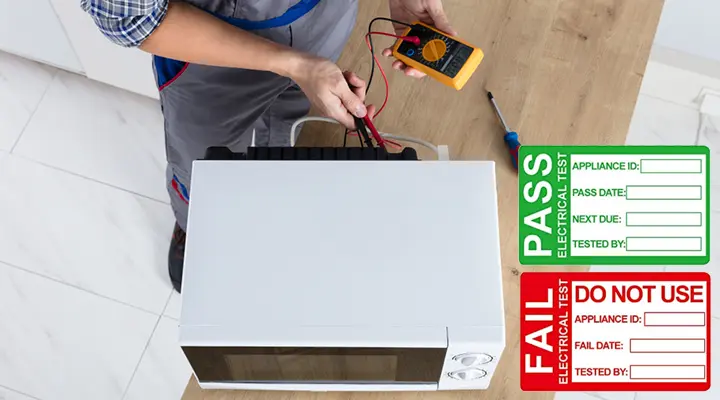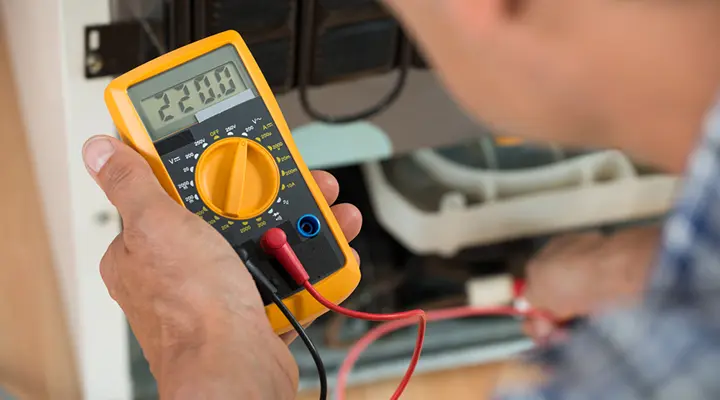Electrical safety is very important, both at home and in work environments. PAT testing is one way to reduce accidents due to faulty electrical equipment. In anticipation of the launch of our PAT Testing and Electrical Safety training course, let’s discuss the key issues surrounding the topic, and how i2Comply can help.
What is PAT Testing?
PAT stands for Portable Appliance Testing. This refers to the process of checking electrical appliances to make sure they are safe to use.
It’s not just portable appliances that should be tested though. Anything that is plugged in to main electricity should be covered by PAT testing.
HSE recommend that checks include user checks, formal visual inspections and PAT testing with a device.
Why is PAT testing important?
PAT testing saves lives. Every year there are fires in homes and workplaces due to electrical faults. And every year there are a small number of deaths due to electric shock at work. Employers can prevent many of these incidents by carrying out thorough PAT testing, on a regular basis.
Some insurance companies require customers to do PAT testing. There is sometimes a clause in the policy that states the company will not pay out after an incident if there is insufficient evidence of PAT testing.
The law requires employers to provide a safe environment for workers, visitors, and anyone who might be affected by an organisation’s activities. PAT testing helps to ensure the environment is safe for everyone.
Who can do the testing?
You do not have to be a qualified electrician to do PAT testing. You do need adequate training in how to do the testing and you need a basic understanding of how electricity works.
Some companies contract the task out to professional PAT testers. Others train someone in-house to do the job. Either way, the company should designate someone in the organisation as the responsible person for PAT testing. This person can do the testing or can communicate with whoever is doing the testing.
Does every business need PAT Testing?
Every business uses electrical equipment, and should assess the risks to decide how often to test the equipment. Some equipment, and some environments, are very low risk and it might be appropriate to decide not to do any testing for now. The business should review this decision regularly as part of ongoing risk assessment.
Most businesses do not fall into that very low risk category and should do PAT testing on a regular and scheduled basis.
What appliances need testing?

Testing any appliance that you plug in to mains electricity is worthwhile.
It is usual to divide appliances into classes, with most appliances in the UK being class I or class II. You need to test Class I items more often than Class II items.
In addition, it is usual to divide appliances into 6 types: stationary, IT, transportable, portable, hand-held and extension leads. Transportable items are those that you can move fairly easily but that stay in one place most of the time (like televisions or electric fans). Portable items are those that you move around a lot – this includes things like kettles, toasters and food mixers.
Stationary and IT items are low risk so you do not need to test them very often. Transportable and portable are medium risk so they need testing more often. Hand-held appliances and extension leads are the highest risk and need the most frequent testing.
Is PAT testing a legal requirement?
There is no law in the UK that says an organisation must do PAT testing. However, the law requires employers to provide a safe working environment.
There are several laws that cover the use of electrical equipment:
The Health and Safety at Work Act 1974 requires organisations to look after the safety of their workers and anyone else who might be affected by what they do. This means they need to take steps to make sure electrical equipment is safe to use.
The Management of Health and Safety at Work Regulations 1999 require organisations to carry out a risk assessment of the potential hazards in the workplace. This includes electrical equipment.
The Provision & Use of Work Regulations 1998 require organisations to make sure any equipment they provide for work is suitable for the intended use, safe to use, maintained appropriately and inspected. This includes electrical equipment.
The Electricity at Work Regulations 1989 require organisations to maintain safe electrical systems, including the wiring in a building and the electrical appliances.
Housing Act 2004 requires landlords to ensure the safety of any electrical appliances that they supply in rented accommodation.
How often should testing be done?
You should determine the frequency of testing with reference to the class and type of equipment, the working environment and the average failure rate for electrical appliances in your organisation.
For example, consider a class I hand-held appliance for use in an office environment where the average failure rate for electrical appliances is 0.5%. This item is higher risk for class (Class I), high risk for type (hand-held), low risk for environment (office) and low risk for average failure rate (0.5%). As a result, you might schedule the item for a visual inspection once a year and a PAT device test every two years.
For more information on the frequency of PAT testing take a look at the HSE publication Maintaining portable electrical equipment.
Looking for a PAT Testing online course?
Our PAT Testing and electrical safety training course is useful for business owners, health and safety managers, those responsible for PAT testing, and users of electrical appliances.
Our online Health & Safety training courses are a perfect way to training your workforce and are very affordable. If you have any questions on pricing, discounts or any other subject, please contact us on 0333 577 5016 or sales@i2comply.com and we will be happy to help.



